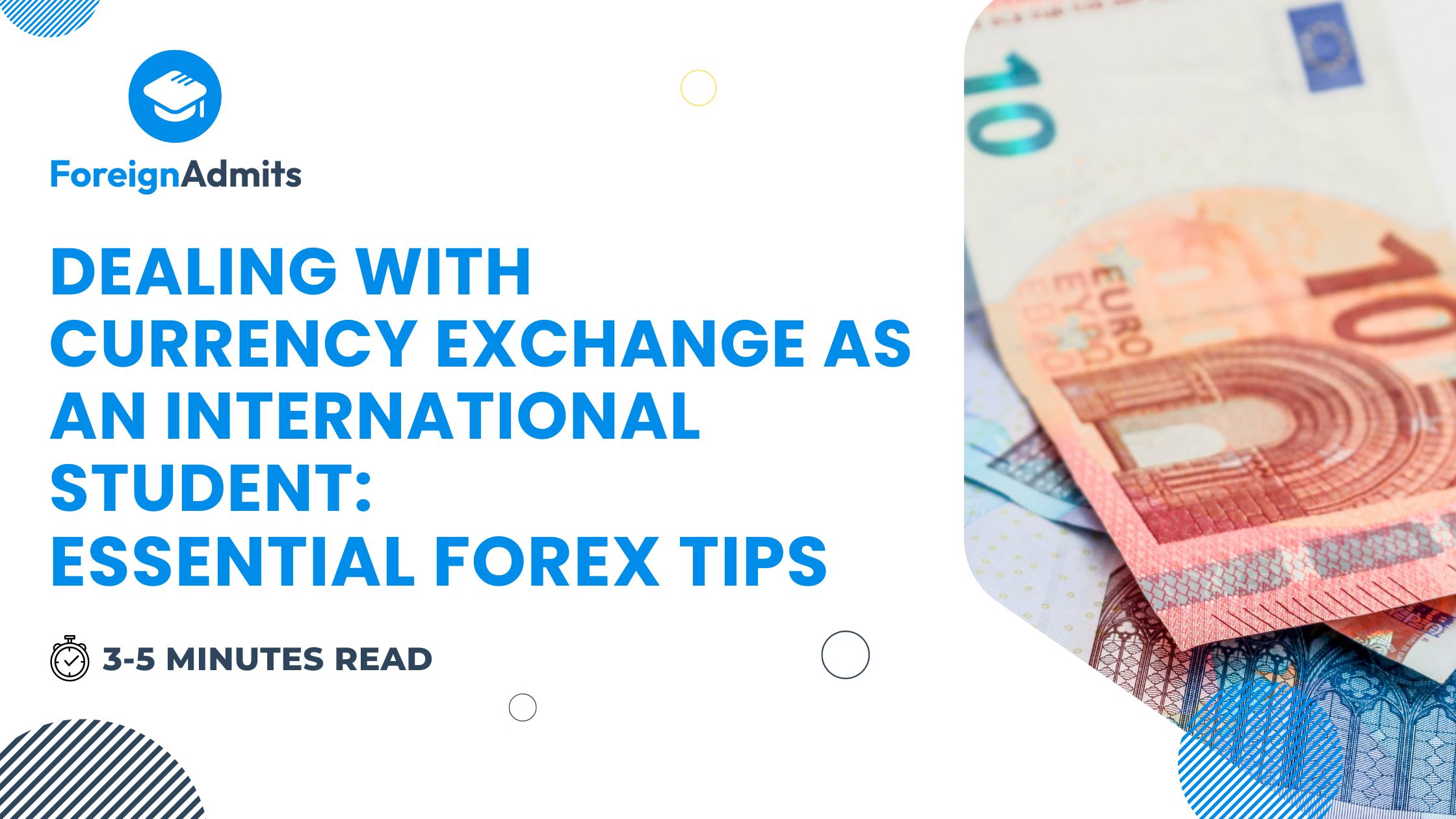Dealing with Currency Exchange as an International Student: Essential Forex Tips (2023)
Table of Contents
- Introduction
- Keep track of exchange rates
- Avoid exchanging money at airports or tourist areas
- Open a local bank account
- Be cautious of scams
- Stay updated on any regulatory changes
- Conclusion
- FAQs
Moving abroad for studies introduces a host of new experiences and challenges, one of which is managing finances in a foreign currency.
Dealing with currency exchange can become a regular affair, yet it is an area fraught with potential pitfalls, such as fluctuating rates and high service fees.
Today, we provide you with essential Forex tips to help you navigate the financial landscape as an international student with confidence and ease.
Keep track of exchange rates

Keeping track of exchange rates can make a world of difference when you’re managing finances as an international student. Understanding how currencies fluctuate can help you plan when to transfer money, helping you take advantage of favourable rates and avoid unnecessary losses.
For example, let’s assume your home currency is the US dollar, and your international student studying in Australia. If the AUD/USD rate fluctuates between 0.70 and 0.75, time your transfers so when the rate is closer to 0.75 means, you ultimately get more Australian dollars for every US dollar you exchange.
Various apps and websites like XE, OANDA, or even Google’s currency converter allow you to monitor exchange rates in real-time. Some of these services also offer rate alerts, notifying you when the currency pair reaches a level you have set.
Nonetheless, no one can forecast exchange rates with absolute certainty because they fluctuate by a plethora of factors ranging from economic statistics to geopolitical developments. So the goal here is not to turn into a Forex trader but to be aware of patterns and make prudent informed decisions accordingly.
Avoid exchanging money at airports or tourist areas
As an international student, you’ll frequently find yourself dealing with currency exchange. One of the first things to remember is to avoid exchanging money at airports or tourist hotspots. These places often have much less favourable exchange rates and may charge higher service fees, knowing that travellers are looking for convenience.
For example, suppose you’ve just landed in Sydney from India and need some Australian dollars immediately. Exchanging INR to AUD at the airport might seem like the most straightforward solution, but you may find that the rate is skewed heavily in favour of the exchange bureau, not to mention the added service fees.
Instead, consider exchanging a small amount in your home country before leaving just for initial expenses like transportation. For the rest, use a reliable local bank or a trusted online currency exchange platform once you’re settled. These sources generally provide much better rates and lower service fees.
With some foresight, you can save substantial money on exchange rates and fees, which can then be redirected towards your tuition fees, student housing rent, or even that trip to the Great Barrier Reef you’ve been dreaming about!
Open a local bank account

As an international student dealing with foreign exchange, opening a local bank account can be your passport to more financial flexibility and savings. With a local bank account, you can reduce or avoid hefty international transaction fees and have easier access to your money for daily expenses.
Let’s imagine you’re a student from India who’s just arrived in the UK for your studies. Converting your entire tuition and living expenses from INR to GBP beforehand might seem tempting, but what if the exchange rate improves later? With a local bank account, you can transfer smaller amounts based on your needs and potentially better rates.
Most banks in host countries offer student-friendly accounts with minimal fees. Some even provide perks like free student railcards or discounts at local retail stores. Research your friend in your host nation: compare what different banks offer before settling on one.
Opening a local bank account might take some time due to documentation and processing. So, plan ahead. Arrange for an initial sum to cover your expenses like transportation costs, amber student housing essentials, and miscellaneous expenses for the first few weeks. Then, once your local account is active, you’re all set to handle your finances more effectively, with a buffer against unexpected forex fluctuations.
Be cautious of scams
When it comes to avoiding scams, navigating the world of currency conversion can sometimes feel like walking through a minefield. Scammers often prey on consumers who are new to foreign exchange services, like international students, promising offers that sound too tempting to be true – which they usually are.
For example, you might come across a website that claims to offer a better conversion rate for your local currency to Euro than the open market rate. They might request that you send funds to a provided account for the ‘exchange.’ However, once the funds have been sent, you are unlikely to hear from them again.
To avoid such scams, always ensure that the exchange service you’re using is legitimate. Check reviews and ratings, or ask fellow students or local friends for their recommendations. It’s better to use well-known, reputable services, even if they might charge a small service fee.
When it comes to your hard-earned study abroad money, it’s safety first.
Stay updated on any regulatory changes
As an international student dealing with foreign exchange, it’s crucial to stay updated on any regulatory changes in your home country or in your host country. These regulations can directly impact the rates, the taxes you might need to pay, and the overall currency exchange process.
For example, consider India’s Reserve Bank’s Liberalised Remittance Scheme (LRS). The LRS sets the limit for the amount of money an Indian student can send abroad for education each financial year.
Now, imagine this: You’ve planned your expenses according to the existing LRS limit, but mid-way through the year, the Reserve Bank of India decides to lower this limit. If you’re unaware of this change, you might be in a tricky financial situation.
Similarly, Australia or the European Union might introduce new laws affecting banking fees or currency exchange services. Being oblivious to such updates could lead to unexpected costs, disrupting your well-planned budget.
So, how can you stay informed? Subscribe to newsletters from financial regulatory authorities and your bank. Follow credible financial news sources. Join online forums or communities of international students where such updates are often shared.
In essence, knowledge of financial regulations is a powerful tool when managing foreign exchange, helping you avoid unwelcome surprises and make the most of your funds.
Conclusion
We hope this article helps you to identify and understand essential Forex tips to navigate the financial landscape as an international student in your host nation.
Financial literacy isn’t a side aspect of your life abroad but an essential part of the study abroad experience. So, stay informed, plan wisely, and focus on your ultimate goal – achieving academic success in your new environment.
FAQ’s
Q. When should I exchange my money for studying abroad?
A: Ideally, it’s best to start tracking exchange rates a few months before you leave. This way, you can exchange your money when rates are in your favour. Also, consider keeping some local currency for immediate expenses upon arrival.
Q. Where should I exchange my currency?
A: Banks, credit unions, online currency exchange platforms, and currency exchange booths at airports or city centres are common options. Always compare rates and fees before choosing.
Q. Can I use my native country’s debit or credit cards internationally?
A: Yes, most cards are globally accepted. But remember that foreign transaction fees or ATM withdrawal fees may apply when you use your card abroad. Check with your native country’s bank before you travel.
Q. Should I open a local bank account in my host country?
A: Definitely! A local bank account can make managing your everyday expenses easier and typically comes with lower fees for local transactions compared to using an international account. It’s also a safer alternative to carrying large amounts of cash.
Q. How to transfer money to my new local bank account from my native country?
A: You can transfer money through bank transfers, online money transfer services, and international money transfer companies. Compare different providers’ fees, exchange rates, and transfer times to find the most cost-effective option.

